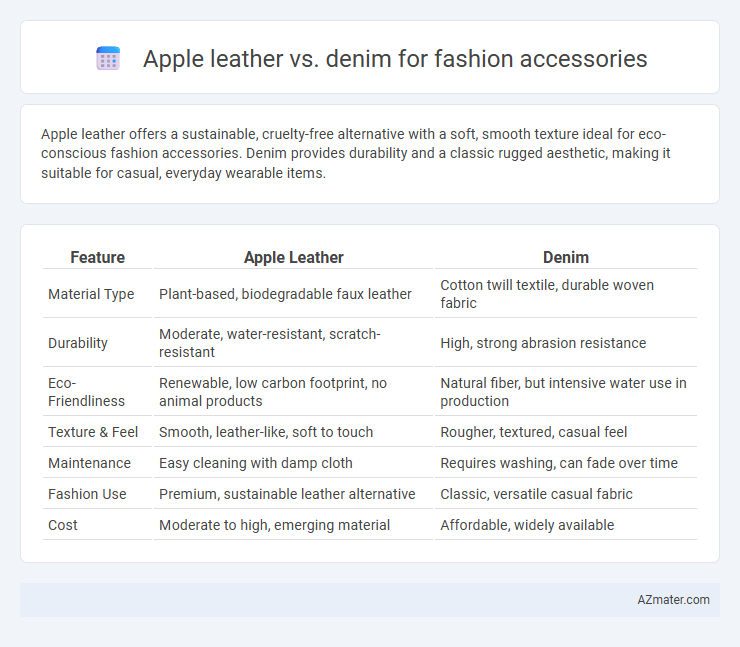Apple leather offers a sustainable, cruelty-free alternative with a soft, smooth texture ideal for eco-conscious fashion accessories. Denim provides durability and a classic rugged aesthetic, making it suitable for casual, everyday wearable items.
Table of Comparison
| Feature | Apple Leather | Denim |
|---|---|---|
| Material Type | Plant-based, biodegradable faux leather | Cotton twill textile, durable woven fabric |
| Durability | Moderate, water-resistant, scratch-resistant | High, strong abrasion resistance |
| Eco-Friendliness | Renewable, low carbon footprint, no animal products | Natural fiber, but intensive water use in production |
| Texture & Feel | Smooth, leather-like, soft to touch | Rougher, textured, casual feel |
| Maintenance | Easy cleaning with damp cloth | Requires washing, can fade over time |
| Fashion Use | Premium, sustainable leather alternative | Classic, versatile casual fabric |
| Cost | Moderate to high, emerging material | Affordable, widely available |
Introduction: The Rise of Sustainable Fashion Materials
Apple leather and denim represent innovative materials transforming the fashion accessory industry through sustainability. Apple leather, made from apple fruit waste, offers an eco-friendly alternative to traditional leather with a lower carbon footprint and biodegradable properties. Denim, often crafted from organic or recycled cotton, remains a durable and versatile choice, supporting sustainable practices by reducing water usage and chemical treatments.
What is Apple Leather?
Apple leather is an innovative, sustainable material made from the byproducts of apple juice production, specifically apple peels and cores, transformed into a durable, eco-friendly alternative to traditional leather. This plant-based leather offers a cruelty-free option with a soft texture, breathability, and resistance to wear, making it ideal for fashion accessories such as bags, wallets, and watch straps. Compared to denim, which is a sturdy cotton fabric known for its casual style and durability, apple leather provides a more polished, versatile aesthetic while supporting waste reduction and sustainable fashion practices.
What is Denim?
Denim is a durable cotton twill fabric characterized by a diagonal ribbing pattern, commonly used in fashion accessories such as bags, shoes, and belts for its rugged texture and long-lasting wear. Unlike apple leather, which is a vegan and sustainable material derived from apple waste, denim offers breathability and a classic, timeless appeal rooted in its sturdy construction. Fashion designers often choose denim for its versatility and ability to age with character, making it a popular choice alongside eco-friendly alternatives like apple leather.
Environmental Impact: Apple Leather vs Denim
Apple leather, made from sustainable apple waste, reduces reliance on animal products and minimizes landfill contributions, offering a biodegradable alternative with lower water consumption and carbon emissions compared to traditional leather. Denim production typically involves intensive water usage, chemical treatments, and energy consumption, resulting in significant environmental pollution and waste. Choosing apple leather for fashion accessories promotes eco-friendly practices by utilizing renewable resources and decreasing the environmental footprint linked to fabric manufacturing.
Durability and Longevity
Apple leather offers moderate durability with resistance to cracking and peeling, ideal for eco-conscious fashion accessories, while denim boasts exceptional longevity due to its robust cotton weave and ability to endure heavy wear and washing. Denim's natural strength and abrasion resistance make it a preferred choice for accessories requiring long-term use, whereas apple leather provides a sustainable yet slightly less durable alternative. Both materials balance aesthetic appeal with functional durability, but denim outperforms apple leather in lifespan and toughness for high-wear fashion accessories.
Style Versatility and Aesthetics
Apple leather offers a sleek, smooth finish with a modern aesthetic that complements both casual and formal fashion accessories, providing a versatile alternative to traditional materials. Denim, known for its rugged texture and timeless appeal, brings a casual, vintage charm that works well with laid-back and streetwear styles. The choice between apple leather and denim ultimately depends on the desired look, where apple leather enhances sophistication and denim emphasizes a relaxed, durable vibe.
Comfort and Textural Differences
Apple leather offers a soft, smooth texture with a supple feel, making it highly comfortable for fashion accessories that require flexibility and lightweight durability. Denim provides a rugged, coarse texture that lends a structured, sturdy feel, ideal for casual accessories demanding toughness and breathability. Comfort in apple leather is enhanced by its organic composition and breathability, whereas denim's thickness and weave contribute to a more resilient, less pliable comfort experience.
Maintenance and Care Requirements
Apple leather requires gentle cleaning with a damp cloth and occasional application of a leather conditioner to maintain its softness and prevent cracking, offering a biodegradable alternative with low environmental impact. Denim accessories demand more frequent washing due to their fabric nature, often requiring cold water cycles and air drying to avoid shrinking and preserve color vibrancy. Both materials benefit from storage away from direct sunlight and moisture to extend the lifespan of fashion accessories.
Cost Comparison: Apple Leather vs Denim Accessories
Apple leather accessories typically have a higher upfront cost than denim due to sustainable production techniques and innovative materials derived from apple waste. Denim remains cost-effective, benefiting from mass production and widespread availability of cotton fabric. Consumers choosing between apple leather and denim must weigh the premium price of eco-friendly apple leather against the affordability and durability of traditional denim accessories.
Choosing the Best Material for Fashion Accessories
Apple leather offers a sustainable and cruelty-free alternative to traditional leather, providing durability and a distinct texture ideal for fashion accessories such as handbags and wallets. Denim, known for its rugged strength and casual appeal, excels in versatility and breathability, making it a preferred choice for backpacks, hats, and casual bags. When choosing the best material for fashion accessories, consider factors like environmental impact, aesthetic preferences, and intended use to balance functionality with style.

Infographic: Apple leather vs Denim for Fashion accessory
 azmater.com
azmater.com